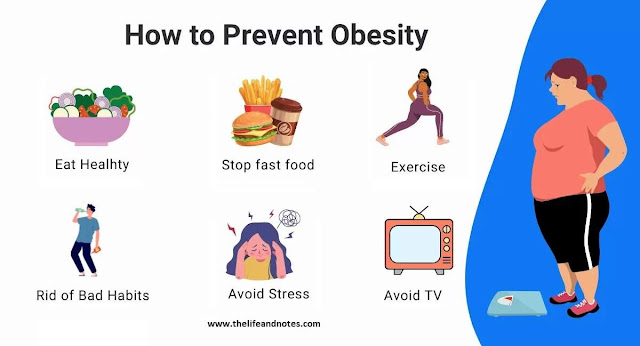Obesity and How to Prevent Obesity?
Obesity has become a major health problem worldwide in recent years. The rapidly increasing prevalance of obesity contributes to an increase...
https://www.thelifeandnotes.com/2023/07/obesity-and-how-to-prevent-obesity.html
Obesity
has become a major health problem worldwide in recent years. The rapidly
increasing prevalance of obesity contributes to an increased risk of many
chronic diseases and negatively impacts quality of life. Therefore, weight
control and obesity prevention are very important for the health of each
individual.
What is Obesity? - Obesity Definition
Obesity
is characterized by an excessive accumulation of body fat, usually due to an
imbalance between energy intake and energy expenditure. Factors such as
insufficient physical activity, unhealthy eating habits, genetic
predisposition, and environmental influences contribute to the development of
obesity.
The
difference between overweight and obesity is determined by body mass index or
BMI. BMI can be calculated by dividing your weight in kilograms by the square
of your height in meters. For adults, a normal BMI is between 18.5 and 24.9.
Between 25 and 29.9 is considered overweight and 30 or more is considered
obese.
What Foods Cause Obesity?
Foods
most commonly associated with weight gain include fatty foods, potato chips,
sweets, sugar-sweetened beverages, refined grains, processed meats, and red
meats.
What are the Dangers of
Obesity?
Regarding
the dangers of obesity, it is well-known that it increases the risk of various
health problems. Obesity is associated with an elevated risk of heart disease,
diabetes, high blood pressure, respiratory problems, joint disorders, sleep
apnea, and certain types of cancer(endometrial, breast and colon). In addition,
obesity can lead to psychological problems, depression, and social isolation.
Therefore, the control of obesity is very important to protect the health of
individuals and improve their quality of life.
How to Prevent Obesity?
There
are many methods of preventing obesity, and most of them are effective and
cost-effective. The methods of
preventing obesity are:
1.
Healthy eating habits
Several
steps can be taken to prevent obesity. Firstly, adopting healthy eating habits
is essential. Following a balanced diet that provides the body with the
necessary nutrients is a critical factor in weight control. Eat less fast food,
sugary and fatty foods and choose vegetables, fruits, whole grains, lean
proteins and healthy fats.
2.
Regular physical activity
Regular
physical activity plays an important role in preventing obesity. Engaging in
moderate-intensity aerobic exercise for at least 150 minutes per week or
high-intensity exercise for 75 minutes per week may support weight control.
Additionally, making active choices in daily activities, such as taking the
stairs instead of the elevator or walking or cycling instead of driving, can
help prevent obesity.
3.
Portion control
Portion
control is also important in preventing obesity. Monitoring the portion sizes
of meals helps reduce excessive calorie intake. It is important to be aware of
the tendency to overeat and to pay attention to hunger and satiety cues. Eating
slowly can aid in better recognizing the feeling of fullness.
4.
Stress management
Furthermore,
stress management can be effective in obesity control. Stress can trigger
overeating or emotional eating in some people. Coping mechanisms such as
exercise, meditation, or engaging in hobbies can help manage stress.
5.
Sleep pattern
Another
step to prevent obesity is to pay attention to your sleep patterns. Lack of
sleep can increase the risk of obesity. Sufficient, quality sleep helps to
maintain hormonal balance and regulate metabolism. Therefore, establishing a
regular sleep routine and paying attention to sleep hygiene are important in
preventing obesity.
6.
Drinking water
Drinking
water is also a factor to help control weight effectively. Water hydrates the
body, gives a feeling of satiety and helps the metabolism to work properly.
Water consumption should be preferred instead of sugary drinks. Drinking at
least 8 to 10 glasses of water a day can help with weight control.
7.
Supportive measures
At
the family and community level, supportive measures must be be in place to
prevent obesity. Encouraging healthy eating and physical activity programs in
schools, facilitating access to healthy foods, and restricting the promotion of
unhealthy foods through advertisements are some steps that can be taken.
8.
Supportive environment
In
addition, promoting a supportive environment is crucial for long-term
successful weight control. This includes creating a culture that promotes
healthy habits and discourages the normalization of unhealthy behaviors.
Support from family, friends, and healthcare professionals can provide
motivation, encouragement, and accountability in the journey towards weight
control. Working with a dietitian or healthcare professional can help create an
individualized nutrition plan and exercise program.
9.
Education and awareness
An
important factor is the role of education and awareness. It is essential to
educate individuals about the risks associated with obesity and the benefits of
weight control. Promoting nutritional literacy and providing information about
healthy food choices, reading food labels, and understanding portion sizes can
empower individuals to make informed decisions about their diet.
10.
Watch out for the food industry
In
addition,, the influence of the food industry should not be underestimated.
Food marketing, particularly aimed at children, often promotes unhealthy,
high-calorie products. Implementing stricter regulations on food advertising
and labeling, especially for products aimed at children, can help create a
healthier food environment.
Lastly,
it's important to realize that weight control and obesity prevention are
long-term endeavors. Embracing a holistic approach that encompasses healthy
eating, regular physical activity, managing stress, and adequate sleep is
crucial for maintaining a healthy weight and overall well-being. Remember,
small steps taken consistently can lead to significant long-term results in
weight control and overall health.
In
conclusion, weight control and the prevention of obesity are vital subjects for
individuals' health and well-being. Healthy eating habits, regular physical
activity, portion control, and stress management are effective measures in
preventing obesity. Additionally, supportive policies and programs should be implemented
at the family and community level. By making conscious and healthy lifestyle
choices, we can defeat obesity and build a healthier future.
More From thelifeandnotes
